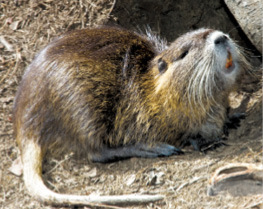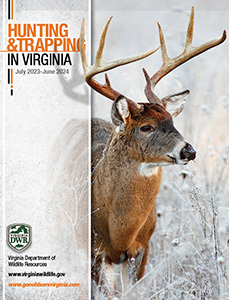Furbearer Hunting
Furbearer Hunting Seasons
Legal Methods and Restrictions
Special restrictions apply to specific firearms use during these seasons. See Legal Use of Firearms & Archery Tackle, and Local Firearms Ordinances, Local Firearms, for details.
- Modern firearms.
- Arrowguns are allowed.
- Archery tackle.
- Muzzleloading firearms.
- Dogs may be used (except where prohibited, see Hunting with Dogs, Hunting Information).
- Electronic calls may be used on private lands for bobcat, coyote, fox, and raccoons with written permission of the landowner and on public lands except where specifically prohibited.
- Hunting permitted day or night.
- Lights may be used as long as the light is not attached to or cast from a vehicle.
- Night vision scopes and laser sights may be used.
Bobcat
Bag Limit
Two per hunting party taken between noon one day and noon the following day.
Archery Season
October 7 through October 31:
Statewide.
Legal Methods and Restrictions
- It is unlawful to use dogs when hunting with archery tackle during the bobcat archery season.
- It is unlawful to have a firearm in possession. (See exception for valid concealed handgun permit holders on Legal Use of Firearms & Archery Tackle.)
- Persons with a disability that prevents them from drawing a bow or crossbow may hunt with an arrowgun during the special archery season provided they have in possession an authorization form provided by the Department that has been completed by their physician.
Firearms Season
November 1 through February 29:
Statewide.
Dogs May Not Be Used to Hunt Bobcats
During the firearms season for deer in the counties of Alleghany, Amherst (west of Route 29), Augusta, Bath, Bedford, Botetourt, Campbell (west of Norfolk Southern Railroad), Clarke, Frederick, Highland, Nelson (west of Rt. 151), Page, Pittsylvania (west of Norfolk Southern Railroad), Rockbridge, Rockingham, Shenandoah, and Warren and within the boundaries of the George Washington/Jefferson National Forests.
Electronic Reporting Requirement for Bobcats
All hunters or trappers who kill a bobcat are required to report the kill within 24 hours through the Department’s electronic harvest reporting system. Bobcats can be reported with a touch-tone telephone (a rotary phone will not work) by calling the toll-free number 866-GOT-GAME (468-4263). Bobcats can also be reported using the mobile app or Internet. Successful hunters and trappers can go to www.gooutdoorsvirginia.com and click on “Harvest Reporting.”
Before using the telephone or Internet reporting system, you will need your hunting license number, a pen, and a piece of paper to record your confirmation number. If you are exempt from purchasing a license, you will need your date of birth (MM/DD/YYYY), the last four digits of your Social Security number and your 5-digit zip code.
At the end of the reporting session, you will be provided with an 8-digit confirmation number. Write this number down and store it in a secure location where it can be retrieved to prove compliance with the reporting requirement or to request CITES tags. If your telephone or Internet session is cut off before you get a complete confirmation number, start the session again and continue until the complete confirmation number is obtained. If you have more than one bobcat to report, you will have the opportunity to report additional animals at the end of the session.
If you plan to take the bobcat to a taxidermist, you must securely attach written documentation to the carcass that includes the full name of the hunter or trapper, date of kill, and the harvest confirmation number.
Bobcats legally killed by landowners outside the season are not required to be reported using the electronic harvest reporting system. If you plan to take a bobcat to a taxidermist that does not require reporting, you must securely attach the same information described above (except for the confirmation number) and a description of how the bobcat was legally obtained.
Coyote
Season
Continuous open season except on National Forest lands and Department lands. Coyote hunting on National Forest lands and Department lands is permitted from September 1 through March 10 and during the spring turkey season. Coyotes may also be hunted on Department lands during the spring squirrel season unless otherwise posted (see Small Game Hunting for list of open areas).
Coyote Bounty Law
Coyote bounties are not administered by DWR. Counties have the option of establishing their own coyote bounty system. For more information, hunters and trappers should contact their County Administrator or County Board of Supervisors.
Fisher
Continuous closed season for hunting or trapping fisher. Please report verifiable sightings (see below).
Fox
Red Fox
Firearms Season
November 1 through February 29:
Closed in Albemarle, Clarke, Culpeper, Fauquier (except Quantico), Loudoun, Louisa, and Rappahannock counties.
Gray Fox
Bag Limit
One per hunting party taken between noon of one day and noon the following day.
Firearms Season
January 1 through February 29:
Closed in Albemarle, Clark, Culpeper, Fauquier (except Quantico), Loudoun, Louisa, and Rappahannock counties.
Dogs May Not Be Used to Hunt Foxes:
During the firearms season for deer on the Gathright, Goshen, Highland, and Little North Mountain Wildlife Management Areas and within the boundaries of the George Washington/Jefferson National Forests.
NOTE: See Harvest Reporting Requirements for gray fox on p. 27.
Chase-Only Season
NO FOXES MAY BE TAKEN EXCEPT DURING THE FIREARMS SEASON.
Licenses Required
License requirements are the same as those for hunting foxes with firearms. However, a Fox Hunting License to hunt foxes on horseback with hounds without firearms may be purchased in lieu of a basic hunting license. This license exempts the licensee from having to complete the hunter education program.
Continuous open season statewide (including Sundays) unless noted below.
- Closed March 1 through October 31 and during the firearms season for deer on the George Washington/Jefferson National Forests and on Gathright, Goshen, Highland, and Little North Mountain WMAs.
- Closed March 1 through October 31 on G. Richard Thompson and Rapidan WMAs.
Restrictions
- Unlawful to have in possession a firearm when hunting fox outside of the firearms fox season. Possession shall include, but not be limited to, having any firearm in or on one’s person, vehicle, or conveyance. (See exception for valid concealed handgun permit holders on Legal Use of Firearms & Archery Tackle.)
Opossum
Firearms Season
October 15 through March 10:
Statewide.
Raccoon
Bag Limits
East of the Blue Ridge: Two per hunter taken between noon one day and noon the following day.
West of the Blue Ridge: Two per hunting party (individual or organized) taken between noon one day and noon the following day.
Firearms Season
October 15 through March 10:
Statewide.
Legal Methods and Restrictions
- Lights may be used as long as the light is not attached to or cast from a vehicle.
Chase-Only Seasons
NO RACCOON MAY BE TAKEN EXCEPT DURING THE FIREARMS SEASON.
Continuous open season statewide:
Except on Department-controlled lands west of the Blue Ridge Mountains and on National Forest lands.
Licenses Required
License requirements are the same as those
for hunting raccoons with firearms.
August 1 through September 30:
On Department-controlled lands west of the Blue Ridge Mountains and on National Forest lands where bear hound training is permitted.
Restrictions
It is unlawful to have in possession a firearm, bow, axe, saw, or any tree climbing device when chasing raccoons outside of the firearms season. Possession shall include, but not be limited to, having these devices in or on one’s person, vehicle, or conveyance while engaged in the act of chasing. (See exception for valid concealed handgun permit holders on Small Game Hunting)
Skunk
Season
Continuous open season to hunt striped skunk except on National Forest lands and Department lands.
Striped skunk hunting on National Forest lands and Department lands is permitted from September 1 through March 10 and during the spring turkey season. Striped skunks may also be hunted on Department lands during the spring squirrel season unless otherwise posted. (See Small Game Hunting for list of open areas.)
Continuous closed season for taking spotted skunks, and the pelts of spotted skunks may not be sold.
Q: Are laser sights, night vision scopes, and infrared scopes legal to use when legally hunting at night?
A: Yes, these devices are legal to use when legally hunting at night. The following animals are legal to hunt at night: bobcat, coyote, feral hog, fox, opossum, raccoon, and skunk.
Q: Can electronic calls be used?
A: Electronic calls may be used to hunt bobcats, coyotes, crows, foxes and raccoons, but not other species. With the exception of crows (see Small Game Hunting), written permission of the landowner is required to hunt with electronic calls on private lands. Electronic calls may also be used on public lands (except where specifically prohibited) during periods when the use of firearms is allowed.
Report a Nutria in Virginia
As part of a multi-agency effort, the DWR is continuing to monitor the distribution of nutria in Virginia. The nutria (Myocastor coypus) is an invasive semi-aquatic mammal native to South America. A casual observer may misidentify a muskrat or beaver as a nutria. Compared to a muskrat, nutria are considerably larger (average 12 pounds), have a round tail, white whiskers, and orange teeth. Nutria cause considerable damage to North American wetlands and are legally defined as a nuisance species in Virginia. Although the current distribution of nutria in the Commonwealth is not completely known, confirmed reports have generally been limited to areas east of Interstate 95 and south of the James River. Improving our understanding of where nutria occur is necessary to support potential eradication efforts. If you believe you have seen a nutria in Virginia, please visit the website below and report your sighting. The information you provide will assist us with the management of this invasive species: https://cmi.vt.edu/ReportNutria.html.


